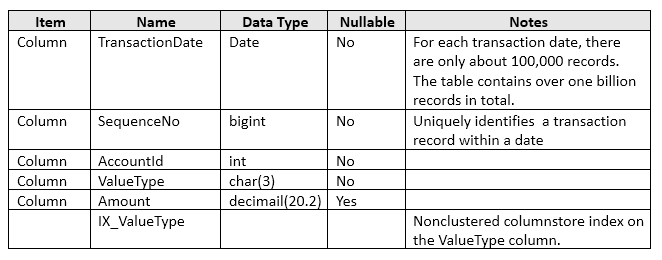

Note: This question is part of a series of questions that use the same answer choices. An answer choice may be correct for more than one question on the series.
Each question is independent of the other questions in this series. Information and details provided in a question apply only to that question.
You work on an OLTP database that has no memory-optimized file group defined.
You have a table names tblTransaction that is persisted on disk and contains the information described in the following table:
Users report that the following query takes a long time to complete.
You need to create an index that:
- improves the query performance
- does not impact the existing index
- minimizes storage size of the table (inclusive of index pages).
What should you do?
Marlow
Highly Voted 5 years, 2 months agoAnette
5 years agokiri2020
4 years, 7 months agorya
Highly Voted 5 years, 3 months agoVijayglobal
5 years, 1 month agostm22
4 years, 11 months agoUsefJuan
4 years, 7 months agoHoglet
4 years, 6 months agoAndy7622
4 years, 5 months agocaeesz
Most Recent 4 years, 5 months agoAkang
4 years, 5 months agoCharlieBrownIsGreat
4 years, 7 months agolh2607
4 years, 7 months agogeekeek1
4 years, 5 months agolh2607
4 years, 7 months agoZSQL
4 years, 7 months agokiri2020
4 years, 7 months agokiri2020
4 years, 7 months agoMML
4 years, 11 months agoARehman
4 years, 6 months agolukadataowner
5 years, 2 months agoPostarion
5 years, 3 months agoNickname17
5 years, 1 month agoPostarion
5 years, 3 months agoPostarion
5 years, 3 months agoJay2
5 years agoJohnFan
5 years, 3 months agostm22
4 years, 11 months agoNickMane
4 years, 9 months agorya
5 years, 3 months ago